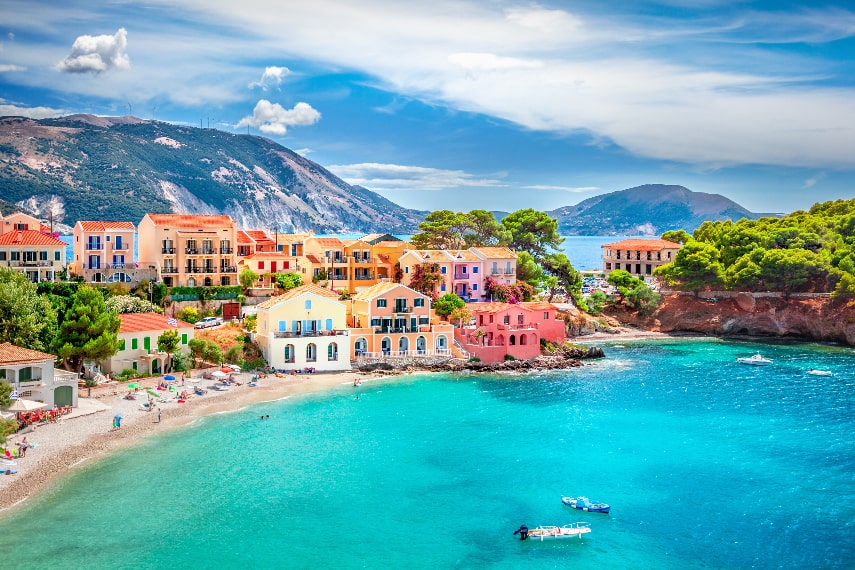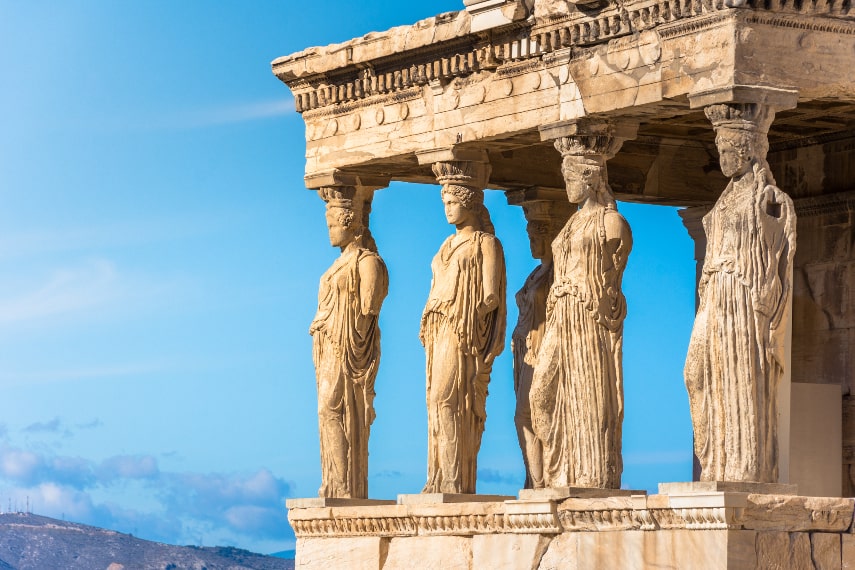If you’re trying to figure out the best time to visit Greece, don’t worry, we’ve got you covered. Our concise month-by-month breakdown makes it simple. So, whether you’re drawn to the historic ancient ruins, the melody of the Aegean waves, or the pulsating energy of Athens’ festivals, we’ve got you. From the iconic Parthenon’s sunlit stones to idyllic sunsets over Santorini to the lively rhythms of Crete, our guide on the best time to visit Greece 2024 will steer you through the myriad of fun adventures awaiting you all year round.
Best Time of the Year to Visit Greece

The magic of Greece is that there’s something for everyone all year round. This means there’s no specific best time to travel to Greece, yet each season offers distinct experiences. From April to June, the spring unveils a country adorned in wildflowers, perfect temperatures and fewer crowds. The peak summer months (July to August) are hot and bustling, ideal for vibrant nightlife and island-hopping. Fall (September to November) brings grape harvests and a comfortable climate, while winter offers a quieter, alternative beauty, particularly in the mountainous regions. Ultimately, the best time to visit Greece hinges on your personal preferences and the experiences you seek.
Cheapest Time to Visit Greece
If you’re looking to travel without straining your purse strings, consider the off-peak seasons. The cheapest time to go to Greece is late April to early June and September to October. These months tend to have fewer tourists, milder weather and often more budget-friendly accommodation and flight options. Making it a lovely blend of affordability and pleasant travel conditions.
Best Time to Visit Greece for Honeymoon

For newlyweds (congratulations) seeking romance infused with that classic Greek charm, between June and September is the best time to go to Greece. The weather is absolutely idyllic, the throngs of peak summer tourists have thinned and the islands, particularly Santorini and Mykonos, offer the most gorgeous and intimate sunsets as well as some much-needed serene beach days.
Best Time to Visit Greece for Beaches

If you’re wondering when to visit Greece for its famous golden sands and stunning cerulean waters, consider late June to early September. The waters are wonderfully warm, so you can enjoy refreshing dips in the Mediterranean and also the beach clubs and coastal activities will be in full swing. Just remember, July and August can get crowded, so early or late summer strikes a perfect balance.
Best Season to Visit Greece
From Athens’ ancient charm to the peaceful Cyclades islands and the mythical Peloponnese coast, every season in Greece has its pros. Whether it’s summer’s sun-kissed shores, autumn’s olive harvests, winter’s festive lights, or spring’s floral tapestry, your Grecian journey, regardless of the season, is bound to be magical. So choosing the best season to visit Greece really does depend on what you’re looking for from your trip.
A Month-By-Month Guide To Visiting Greece
Greece in January

January in Greece ushers in the crisp embrace of winter, blanketing ancient ruins with a gentle dusting of frost. As the rest of Europe shivers, Greece’s milder climate reveals serene landscapes and quiet coastlines. While the popular islands hibernate, the mainland comes alive with authentic festivities. It’s a great time to discover the snowy mountaintops of the north or partake in Epiphany celebrations where locals dive for the cross. An off-season treasure, January in Greece is more of a tranquil retreat away from the tourist bustle. The perfect time to explore the country’s age-old traditions and enjoy the charm of a quieter, more introspective Greece.
Greece in February
February in Greece is a mosaic of cool breezes and vibrant festivals. As winter continues, snow-capped peaks contrast beautifully with azure seas. Yet, the true heart of the month lies in its spirited Carnival, or “Apokries.” Towns burst with colours, costumes and dancing, celebrating pre-Lenten traditions rooted in ancient times. Venture to Patras, the epicentre of festivities, or explore quieter corners like Nafplio. As almond trees begin to blossom, signalling the imminent arrival of spring, Greece in February balances between the serenity of winter and the pulse of celebration, making it a unique time to explore.
Greece in March

Greece in March is when spring begins to bloom. As days grow longer, wildflowers bloom beneath the ancient Acropolis and olive groves come alive with chirping cicadas. This is the month of “Alkionides Meres,” the bright, sunny days of March. While the coastal waters may still be crisp, the appeal of less crowded beaches is undeniable. Wander the lanes of Santorini or Mykonos without the summer masses. Experience the soulful transition from winter to spring during the equinox and perhaps partake in some of the lively festivities of Clean Monday.
Greece in April

April in Greece is a canvas painted with vibrant spring colours. Wildflowers carpet the countryside and the iconic blue seas start pulling in a crowd once again. Easter celebrations bring a festive air, with locals embracing age-old traditions, candle-lit processions and feasts. The Mediterranean warmth makes its subtle return, ideal for leisurely strolls through historic Athens or wine-tasting in Crete’s vineyards. The islands, still devoid of peak-season crowds, make for the most tranquil escape. Whether you’re chasing the mystique of Delphi or the sunsets of Oia, April’s gentle ambience and cultural richness make it an ideal time to experience Greece’s many facets.
Greece in May
May sees Greece in full bloom under the embrace of the Mediterranean sun. The islands shimmer with a golden hue, their beaches increasingly tempting as the waters warm. Olive groves flourish and local festivals echo with music and dance. Tourists begin to trickle in, yet it’s still peaceful enough for those seeking serene vistas and unhurried explorations. Whether wandering the ancient ruins of Olympia, tucking into fresh seafood in a Mykonos taverna, or hiking Samaria Gorge in Crete, May in Greece offers plenty of culture, nature and lovely weather, setting the stage for the summer ahead.
Greece in June

June in Greece is a sun-kissed affair. As summer unfurls, beach life becomes the epicentre of activity. The crystal blue waters of the Aegean and Ionian Seas attract swimmers and sunbathers alike. Islands like Santorini and Rhodes buzz with energy, yet retain their idyllic charm. Al fresco dining is a must, with evenings spent enjoying grilled octopus and ouzo under starlit skies. Historic sites, like the Acropolis, radiate beneath the warm glow, while local festivals celebrate the season’s abundance. June strikes a balance between the vivacity of peak summer and the tranquillity of shoulder seasons – a perfect Greek sojourn.
Greece in July
July heralds the zenith of Greek summer. Islands from Mykonos to Crete pulse with vibrancy, drawing travellers to their shimmering shores and lively nightlife. Streets come alive with festivals, music and dances celebrating age-old traditions. The Mediterranean sunbathes ancient ruins in a golden hue, evoking tales of gods and heroes. While it’s the hottest month, the balmy evenings and coastal breezes make it utterly delightful. Whether diving into cerulean waters, feasting on mezze by the beach, or witnessing a sunset in Oia, July encapsulates the quintessential Grecian experience.
Greece in August

August in Greece is a sun-soaked symphony of lush blue waves and sizzling beach sands. As the peak tourist month, the islands, especially places like Santorini and Mykonos, are a hotspot for revellers and sun-seekers. Traditional festivities abound, with the ‘Panigiria’ village feasts taking centre stage. While temperatures soar, the Meltemi winds bring a refreshing reprieve. It’s a time when the old-world charm of Greece effortlessly mixes with a modern holiday vibe. From dancing barefoot on the sands to stargazing amidst ancient ruins,
Greece in September
September in Greece is a gentle transition from summer’s fervour to autumn’s embrace. The tourist hustle recedes, unveiling quieter beaches and more serene island landscapes. The waters remain invitingly warm, making it perfect for leisurely swims and sunset cruises. Olive groves begin their dance in the soft winds, while vineyards prepare for the harvest, introducing travellers to the authentic rhythms of Greek life. With pleasant temperatures and a laid-back atmosphere, September is ideal for those seeking relaxation and plenty of cultural immersion.
Greece in October

As October graces Greece, the ambience shifts to a mellower, autumnal vibe. The summer crowds have dispersed, leaving historical sites like the Acropolis more accessible to genuine explorers. Olive and grape harvests are in full swing, offering a unique opportunity to partake in traditional Greek festivities. The seas, still warmed from the summer, are primed for one last dip, while cooler evenings set the scene for cosy taverna dinners. Fall foliage paints mainland Greece in golden hues, making scenic drives and hikes especially incredible. In October, Greece reveals a tranquil side, promising a trip full of cultural richness and natural beauty.
Greece in November
November in Greece is the onset of cooler, crisper days, as the country wraps itself in the embrace of late autumn. The olive harvest continues, adding a festive spirit to rural areas. While the islands quieten down, the mainland flourishes with fall colours, making it an ideal time for nature walks. Tourist spots, free from summer’s hustle, allow for intimate experiences with Greece’s timeless history. Though beach days may be numbered, the Mediterranean climate ensures mild temperatures, perfect for enjoying the world-famous Greek cuisine by a fireside. November unveils a Greece steeped in authenticity and quiet charm.
Greece in December

December in Greece is alive with festive spirit as well as super serene landscapes. As winter takes hold, snow caps the mountains, creating picturesque views, especially in the northern regions. Cities light up in celebration of Christmas, with Athens offering a particularly magical vibe. It’s a time when locals embrace traditions, adding warmth to the chilly air. While beach activities wind down, the focus shifts to historical sites, less crowded and waiting to share their tales. This is the perfect time to take in a quiet island getaway or indulge in the vibrant festivities of urban centres.
Greece, with its timeless appeal, ensures a memorable experience no matter the month. Our guide to the best time to visit Greece 2024 unravels the nuances of each season to assist you in creating the perfect Grecian itinerary. Whether you’re drawn to the ancient stories echoing through Athens, the sun-kissed islands, or vibrant festivals, Greece is full of fun adventures. So gear up for a journey that serenades you with enchanting moments throughout the whole year.
Read Also: Best time to visit Maldives | Best time to visit Iceland | Best time to visit Dubai
Best time to visit Turkey | Best time to visit Italy | Best time to visit Spain
FAQs for Best time to visit Greece
July and August are the peak summer months in Greece, bringing sizzling temperatures. These months are ideal for sunbathers and those looking for a classic Mediterranean summer. But see above for the Greece weather by month.
The rainy season in Greece is during the winter months, particularly from November to February. It’s a period of cooler temperatures, sporadic showers and occasional thunderstorms.
For a well-rounded experience of Greece’s historical sites, islands and culture, a stay of 10 to 14 days is ideal. This provides ample time to explore, relax and immerse in all its beauty. Remember that Greece time is two hours ahead in winter and three hours ahead in summer.











 ATOL certificate
ATOL certificate









